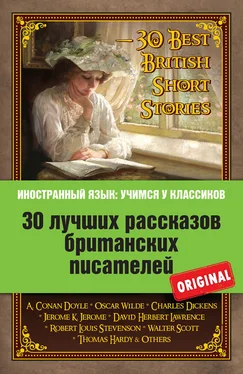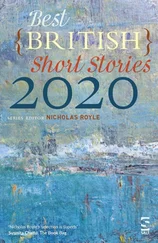1 ...7 8 9 11 12 13 ...113 And now down came a tearing rain, driven by a blast from the Atlantic, howling among the gravestones, and screaming in the battlements of the tower and its bell-chamber windows. The night was so dark, and the rain fell so heavily, that they could see nothing for full half an hour. But then the clouds were rent asunder, and the moon glared white and ghastly over the churchyard.
Elizabeth caught her husband by the arm and pointed. There was, however, no need for her to indicate that on which his eyes were fixed already.
Both saw a lean hand come up out of the grave, and lay hold of one of the fine linen sheets and drag at it. They saw it drag the sheet by one corner, and then it went down underground, and the sheet followed, as though sucked down in a vortex; fold on fold it descended, till the entire sheet had disappeared.
‘Her have taken it for her windin’ sheet,’ whispered Elizabeth. ‘Whativer will her do wi’ the rest?’
‘Have a drop o’ gin; this be terrible tryin’,’ said Jabez in an undertone; and again the couple put their lips to the bottle, which came away considerably lighter after the draughts.
‘Look!’ gasped Elizabeth.
Again the lean hand with long fingers appeared above the soil, and this was seen groping about the grass till it laid hold of the teapot. Then it groped again, and gathered up the spoons, that flashed in the moonbeams. Next, up came the second hand, and a long arm that stretched along the grave till it reached the other sheets. At once, on being raised, these sheets were caught by the wind, and flapped and fluttered like half-hoisted sails. The hands retained them for a while till they bellied with the wind, and then let them go, and they were swept away by the blast across the churchyard, over the wall, and lodged in the carpenter’s yard that adjoined, among his timber.
‘She have sent ’em to the Hexts,’ whispered Elizabeth. Next the hands began to trifle with the teapot, and to shake out some of the coins.
In a minute some silver pieces were flung with so true an aim that they fell clinking down on the floor of the porch.
How many coins, how much money was cast, the couple were in no mood to estimate. Then they saw the hands collect the pillow-cases, and proceed to roll up the teapot and silver spoons in them, and, that done, the white bundle was cast into the air, and caught by the wind and carried over the churchyard wall into the wheelwright’s yard.
At once a curtain of vapour rushed across the face of the moon, and again the graveyard was buried in darkness. Half an hour elapsed before the moon shone out again. Then the Hockins saw that nothing was stirring in the cemetery.
‘I reckon us may go now,’ said Jabez.
‘Let us gather up what she chucked to us,’ advised Elizabeth. So the couple felt about the floor, and collected a number of coins. What they were they could not tell till they reached their home, and had lighted a candle.
‘How much be it?’ asked Elizabeth.
‘Three pound five and fourpence, exact,’ answered Jabez.
James Matthew Barrie
The Inconsiderate Waiter
Frequently I have to ask myself in the street for the name of the man I bowed to just now, and then, before I can answer, the wind of the first corner blows him from my memory. I have a theory, however, that those puzzling faces, which pass before I can see who cut the coat, all belong to club waiters.
Until William forced his affairs upon me that was all I did know of the private life of waiters, though I have been in the club for twenty years. I was even unaware whether they slept downstairs or had their own homes; nor had I the interest to inquire of other members, nor they the knowledge to inform me. I hold that this sort of people should be fed and clothed and given airing and wives and children, and I subscribe yearly, I believe for these purposes; but to come into closer relation with waiters is bad form; they are club fittings, and William should have kept his distress to himself, or taken it away and patched it up like a rent in one of the chairs. His inconsiderateness has been a pair of spectacles to me for months.
It is not correct taste to know the name of a club waiter, so I must apologise for knowing William’s, and still more for not forgetting it. If, again, to speak of a waiter is bad form, to speak bitterly is the comic degree of it. But William has disappointed me sorely. There were years when I would defer dining several minutes that he might wait on me. His pains to reserve the window-seat for me were perfectly satisfactory. I allowed him privileges, as to suggest dishes, and would give him information, as that someone had startled me in the reading-room by slamming a door. I have shown him how I cut my finger with a piece of string. Obviously he was gratified by these attentions, usually recommending a liqueur; and I fancy he must have understood my sufferings, for he often looked ill himself. Probably he was rheumatic, but I cannot say for certain, as I never thought of asking, and he had the sense to see that the knowledge would be offensive to me.
In the smoking-room we have a waiter so independent that once, when he brought me a yellow chartreuse, and I said I had ordered green, he replied, ‘No, sir; you said yellow.’ William could never have been guilty of such effrontery. In appearance, of course, he is mean, but I can no more describe him than a milkmaid could draw cows. I suppose we distinguish one waiter from another much as we pick our hat from the rack. We could have plotted a murder safely before William. He never presumed to have any opinions of his own. When such was my mood he remained silent, and if I announced that something diverting had happened to me he laughed before I told him what it was. He turned the twinkle in his eye off or on at my bidding as readily as if it was the gas. To my ‘Sure to be wet to-morrow,’ he would reply, ‘Yes, sir;’ and to Trelawney’s ‘It doesn’t look like rain,’ two minutes afterward, he would reply, ‘No, sir.’ It was one member who said Lightning Rod would win the Derbyand another who said Lightning Rod had no chance, but it was William who agreed with both. He was like a cheroot, which may be smoked from either end. So used was I to him that, had he died or got another situation (or whatever it is such persons do when they disappear from the club), I should probably have told the head waiter to bring him back, as I disliked changes.
It would not become me to know precisely when I began to think William an ingrate, but I date his lapse from the evening when he brought me oysters. I detest oysters, and no one knew it better than William. He has agreed with me that he could not understand any gentleman’s liking them. Between me and a certain member who smacks his lips twelve times to a dozen of them William knew I liked a screen to be placed until we had reached the soup, and yet he gave me the oysters and the other man my sardine. Both the other member and I quickly called for brandy and the head waiter. To do William justice, he shook, but never can I forget his audacious explanation: ‘Beg pardon, sir, but I was thinking of something else.’
In these words William had flung off the mask, and now I knew him for what he was.
I must not be accused of bad form for looking at William on the following evening. What prompted me to do so was not personal interest in him, but a desire to see whether I dare let him wait on me again. So, recalling that a caster was off a chair yesterday, one is entitled to make sure that it is on to-day before sitting down. If the expression is not too strong, I may say that I was taken aback by William’s manner. Even when crossing the room to take my orders he let his one hand play nervously with the other. I had to repeat ‘Sardine on toast’ twice, and instead of answering ‘Yes, sir,’ as if my selection of sardine on toast was a personal gratification to him, which is the manner one expects of a waiter, he glanced at the clock, then out at the window, and, starting, asked, ‘Did you say sardine on toast, sir?’
Читать дальше
Конец ознакомительного отрывка
Купить книгу












